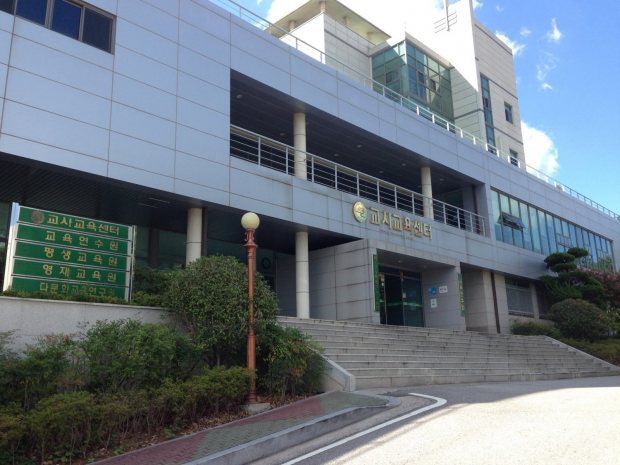
Gwangju-Jeonnam Chapter February Meeting
.
----- Morning Reflective Practice Session -----
No RP Session scheduled for February
(Pre-conference morning session scheduled for March 12.)
----- Main Meeting Schedule -----
Time: Saturday, February 13, 2016, 1:45 - 5:00 pm
NEW Location: Gwangju National University of Education (GNUE), Teacher Training Center (교사교육센터) 1st Floor; Room 811. Detailed directions HERE.
1:45 pm: Sign-in and Meet-and-Greet (Admission is free. Future membership is welcomed.)
2:00 - 2:50 pm: Presentation 1
Effort- and Improvement-Based Grading for General Skills Language Classes
Daniel Corks (Dongshin University)
2:50 - 3:10 pm: Refreshment Break
3:10 - 4:00 pm: Presentation 2
Creating an Edge as an ELT Professional in Korea
Nancy Harcar (Kwangju Women's University)
4:10 - 5:00 pm: Swap-Shop Presentations
Share your Teaching Ideas, Classroom Activities, and Teaching Wisdom with the group.
(Everyone is encouraged to share. Short tidbits are welcomed. Handouts also welcomed.)
5:00 pm: Announcements / Drawing for Door Prizes / Closing
Presentation Summaries and Presenter Bio-sketches
.
Effort- and Improvement-Based Grading for General Skills Language Classes
By Daniel Corks
Students often come into a general skills language class with a wide range of ability levels among them, and it is our task to help all of those students improve their language proficiency. When creating a marking system to assess these students, we want to be fair and make sure everyone has a chance to excel in our class. But, the most straightforward thing to evaluate – ability – is often the least fair in this situation, and we can end up rewarding students for ability they had before ever enrolling in our class. This can easily result in discouraging lower-ability students who know they can’t realistically catch up to the higher-ability students within the span of just a few months. Such assessment doesn’t help the high-ability students either as it doesn’t encourage them to improve.
An assessment system that rewards effort and improvement over ability can solve this problem by giving low-level students a fair chance of receiving a high grade in the class (important in situations where there’s a limit on how many students can receive an A, as is the case in many university settings). More importantly, however, it encourages all students to cultivate and demonstrate the skills and habits of effective language learners that will help them continue to develop their ability after the course is finished.
This presentation will briefly expand on the rationale for this type of assessment system, and then present a series of specific ideas for assessing both effort and improvement, including potential problems with some approaches. There will be ample time for group discussion, and participants are encouraged to bring their own suggestions to share with the audience.
The Presenter
 Daniel Corks is a graduate of Sogang University in Seoul, with a master‘s degree in Applied Linguistics in the field of Second Language Acquisition. He is currently an assistant professor at Dongshin University in Naju, Jeonnam, and a member of the Gwangju-Jeonnam Chapter of KOTESOL.
Daniel Corks is a graduate of Sogang University in Seoul, with a master‘s degree in Applied Linguistics in the field of Second Language Acquisition. He is currently an assistant professor at Dongshin University in Naju, Jeonnam, and a member of the Gwangju-Jeonnam Chapter of KOTESOL.
_______________
Creating an Edge as an ELT Professional in Korea
By Nancy Harcar
In the rush and confusion of moving to a new country, starting a new job, and getting acclimated to a new culture, there are so many new things to learn; it can be overwhelming and all-consuming. Especially in the harried beginnings of an overseas move, the important process of mindfully planning one’s career and other further development often falls by the wayside. The habit of dealing with the day-to-day challenges of living and working in a different culture can too easily remain our only focus for too long. The reality is that this pause in career development can seriously hamper your future career progression. By the time you decide you want to move up in your teaching career, move on to another foreign country, or go back to your passport country, you may have spent years just spinning your wheels with no new career highlights to speak of in an interview. You may find yourself stuck and having to start over.
This presentation will introduce a number of different topics related to developing yourself personally and professionally while living and working overseas. It will outline some key points of the presenter’s own personal and professional development since coming to Korea to become a middle school teacher, and the progression to her current position as an assistant professor of English at a local university. She will describe the conscious career decisions that helped to prepare her for her future, and also some personal community involvement activities that were a surprising fit with her overall professional development narrative. Nancy will describe numerous local, overseas, and online opportunities for involvement, growth, and education, while suggesting some tips to keep an eye on relevance for future job considerations in other countries and repatriation back home. If you are looking to refresh your resume, this talk is a must. Topics covered will include language development, various avenues of furthering your education and acquiring certifications, accepting leadership positions, membership in professional clubs, and more.
The Presenter
 Nancy M. Harcar has been teaching English in Korea since 2009. She currently works at Kwangju Women’s University in the International Education Center, where she is an assistant professor of English. She has been quite active in the Gwangju community as a fundraiser, volunteer, and event organizer. Nancy has recently been accepted to the U.S. Department of State 2016-17 English Language Fellow Program, and is currently awaiting the news of her country and project assignment.
Nancy M. Harcar has been teaching English in Korea since 2009. She currently works at Kwangju Women’s University in the International Education Center, where she is an assistant professor of English. She has been quite active in the Gwangju community as a fundraiser, volunteer, and event organizer. Nancy has recently been accepted to the U.S. Department of State 2016-17 English Language Fellow Program, and is currently awaiting the news of her country and project assignment.
_______________
Photo: The Teacher Education Center (교사교육센터) at GNUE, our meeting venue, Room 811.



